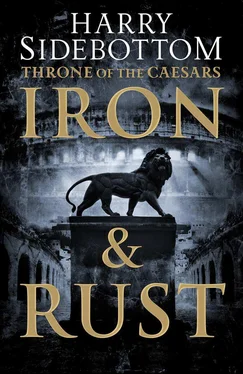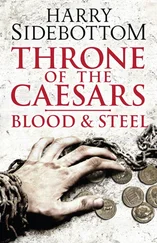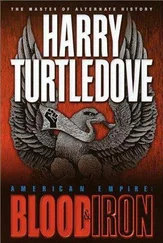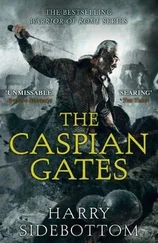Harry Sidebottom - Iron and Rust
Здесь есть возможность читать онлайн «Harry Sidebottom - Iron and Rust» — ознакомительный отрывок электронной книги совершенно бесплатно, а после прочтения отрывка купить полную версию. В некоторых случаях можно слушать аудио, скачать через торрент в формате fb2 и присутствует краткое содержание. Год выпуска: 2014, Издательство: HarperCollins Publishers, Жанр: Исторические приключения, на английском языке. Описание произведения, (предисловие) а так же отзывы посетителей доступны на портале библиотеки ЛибКат.
- Название:Iron and Rust
- Автор:
- Издательство:HarperCollins Publishers
- Жанр:
- Год:2014
- ISBN:нет данных
- Рейтинг книги:4 / 5. Голосов: 1
-
Избранное:Добавить в избранное
- Отзывы:
-
Ваша оценка:
- 80
- 1
- 2
- 3
- 4
- 5
Iron and Rust: краткое содержание, описание и аннотация
Предлагаем к чтению аннотацию, описание, краткое содержание или предисловие (зависит от того, что написал сам автор книги «Iron and Rust»). Если вы не нашли необходимую информацию о книге — напишите в комментариях, мы постараемся отыскать её.
Iron and Rust — читать онлайн ознакомительный отрывок
Ниже представлен текст книги, разбитый по страницам. Система сохранения места последней прочитанной страницы, позволяет с удобством читать онлайн бесплатно книгу «Iron and Rust», без необходимости каждый раз заново искать на чём Вы остановились. Поставьте закладку, и сможете в любой момент перейти на страницу, на которой закончили чтение.
Интервал:
Закладка:
No province would result from this war of Maximinus’. It would consume men and materials. It would devour money. Maximinus had got his hands on the wealth hoarded by Alexander’s grasping mother. Now that he had doubled the pay of the troops, it would soon run out. Refitting the army would be expensive; conducting new levies even more so. Perhaps the treasury was empty already. Pupienus had loathed Valerius Messala, but was unconvinced that he had conspired with Magnus. The sybaritic patrician had been too indolent. More likely, his crime was marriage to Alexander’s sister Theoclia. Of course, she had died too. The accusation of treason against the dead Emperor’s ex-wife, inoffensive Memmia Sulpicia, strained all credulity. The victims had been chosen because of their links to Alexander, but they had been killed for their estates. They would not be the last. When an Emperor runs short of money, informers thrive and the rich live in fear.
It was good that one of his sons was Consul now, and better that the younger was with the army and would take up office with Maximinus in January. Pupienus remained Prefect of the City. All of this proclaimed the loyalty of the family to the regime. Yet, in a climate of suspicion, more active proofs might be required.
Pupienus ran his eyes over the assembled Senators, like a stockman surveying his pens. He had given Gallicanus his word, but the Cynic was a traitor. Besides, Gallicanus posed a threat. If his posturing led him to the cellars of the Palatine, how long would his much-vaunted philosophy sustain him when his body was racked on the horse and men skilled in their task got to work with the claws? What account might he give of the conversation in Pupienus’ house? Of course, the accusations he mouthed in his agony would win no credence if Pupienus himself had denounced him.
And there, standing by Balbinus, was Valerius Priscillianus, brother of the freshly condemned traitor Messala. He was rich as Croesus. There was a family history of treachery. His grandfather had been sent to the block in the reign of Caracalla. Priscillianus’ father, Apollinaris, was governing Asia, a wealthy province far out of sight of the court; an old man embittered by the execution of both father and one son; the remaining child whispering vengeance … the accusation almost framed itself.
And what of Balbinus himself? Venal, porcine, debauched — who could consider the world would not be a better place without his heavy, shambling tread?
Pupienus reined in his thoughts. Senators should not denounce Senators. Since Actium, they had had two and a half centuries living under one Emperor after another Emperor. Tacitus showed how it was to be done with integrity and dignity. Walk the middle path between, on the one side, outspoken independence, with its dangers and futility, and, on the other, grovelling servility, which debases and corrupts. Pray for good Emperors, but serve who you get. It should be possible to live under the principate and not be too deeply tainted.
‘I call on the gods, the guardians and defenders of our empire, speaking as Consul on behalf of all humanity, to look to the safety of our Emperor. As he rules the Res Publica well and in the interests of all, preserve him for our grandsons and great-grandsons.’
Noble sentiments and fine phrases on which to end. There was scattered applause. For many of the plebs the inclement weather had overcome their curiosity or interest in elite rhetoric. Most of the Senators accompanied the new Consul back to his home on the Esquiline. Pupienus found himself walking next to Balbinus. His thoughts held in like a horse on a cruel snaffle bit, he made polite conversation with the corpulent patrician. A Senator should strive to avoid public rivalry and bickering with his colleagues. It was undignified to win such battles and ignominious to be beaten. When they reached the Carinae, Balbinus turned aside to his own house. Although his departure showed less than perfect respect for the new Consul and his family, nevertheless, it was not disagreeable to Pupienus.
Pupienus Maximus’ house was crowded. It was not a large property. This was an expensive area. The dowry that had come with Tineia had been large, but not ostentatious. Pescennia Marcellina was prominent among those waiting in the atrium. Pupienus had known she would be there. She looked frail, but Pupienus was nearing sixty himself. He had been very young, just arrived in Rome, when he had caught her eye. She had taken him in, clothed and fed him, taught him the ways of the world. She had launched him into public life, paid all his expenses until his Praetorship. It was not until the profits of his governorship of Bithynia-Pontus that he had acquired any money of his own.
Pupienus watched his son greet Pescennia with unfeigned pleasure. The scandalous reasons that rumour supplied for an unmarried woman having showered her wealth on a younger man merely served to make both Pescennia and Pupienus more dashing in the eyes of his son. Youthful indiscretions gain glamour when they are safely in the past. Pupienus knew his wife did not share such a view.
Sextia Cethegilla was seated at the far side of the atrium. After a few words with Pescennia, affectionate but formal, Pupienus made his way to the side of his wife. Sextia was talking to two younger women. One was a neighbour, Iunia Fadilla. There was no denying the beauty of this great-granddaughter of the Emperor Marcus Aurelius, but her life was thought to be disreputable. Old Nummius had left her wealthy, and scandal attached to her widowhood. Even before the death of her husband, she was said to have been the mistress of the younger Gordian, and recently there had been stories concerning her and a worthless young poet called Ticida. The other young woman — dark where Iunia Fadilla was blonde — was Perpetua, wife to his friend Serenianus. Greeting them affably, Pupienus considered that if he were overseas governing Cappadocia, he might wish his young wife left in Rome had some companion other than Iunia Fadilla.
The women talked and Pupienus took in the crowd. He had expected to see another from his youth, from before the days of Pescennia, from the years at Tibur. Among this affluence, Pinarius would have stood out, but there was no sign of him.
Over by the shrine of the household gods, his brother-in-law Sextius Cethegillus was cloistered with Cuspidius Flaminius. With them was Flavius Latronianus. It was an honour that the eminent ex-Consul had attended. Making polite excuses, Pupienus moved to join them.
‘Let me through.’ There was no mistaking the arrival of Pinarius. Large, clad in rustic homespun, the old man barged towards Maximus. The new Consul looked less than delighted.
‘Come here, boy.’ Pinarius enfolded Maximus in a bear hug. The latter stood very rigid. It was one thing to be presented with a reminder of his father’s raffish past as a young politician in Rome, quite another to be confronted with living evidence that your progenitor was raised in the apartment of the head gardener of the Emperor’s villa at Tibur. If only you knew what came before that, Pupienus thought.
‘What is it?’ Pinarius had released Maximus. The latter had stepped back. ‘The smell of onions?’ The old man laughed. ‘My cart shed a wheel, near the fourth milestone. I had to get a ride in a farm wagon.’
Pupienus felt a surge of affection so strong it almost brought tears to his eyes. In an uncertain world where friendship so often was tempered by advantage, it was good to have one man you could trust without reserve. Pinarius had brought him up without complaint, with rough fondness, as if an old-fashioned father. In almost half a century Pinarius had not spoken of Voleterrae, of the things that had gone before and what Pupienus had done there since.
Читать дальшеИнтервал:
Закладка:
Похожие книги на «Iron and Rust»
Представляем Вашему вниманию похожие книги на «Iron and Rust» списком для выбора. Мы отобрали схожую по названию и смыслу литературу в надежде предоставить читателям больше вариантов отыскать новые, интересные, ещё непрочитанные произведения.
Обсуждение, отзывы о книге «Iron and Rust» и просто собственные мнения читателей. Оставьте ваши комментарии, напишите, что Вы думаете о произведении, его смысле или главных героях. Укажите что конкретно понравилось, а что нет, и почему Вы так считаете.












